Today we are looking at an old Czech fairytale – The Bird of Happiness, or in Czech, Pták štěstí. It is an old Chod tale.
I will first present actual scans of the book, then the text of the story, and finally, at the very end, a link to a pdf file which you may download for printing or future use. I hope you enjoy the story of the lucky bird (the bird of happiness).
fia
Side note: The Chodové (Chods, known as”Walkers”, “Patrollers” or “Rangers”) are an ethnic group living in western Bohemia. Today, the Chodové live in an arc of villages near the western border of the Czech Republic, including major population centers in Domažlice, Tachov and Přimda (together called the Chod region, Czech: Chodsko). They speak the Chod dialect, a separate dialect of Czech, enjoy unique and strong traditions such as the use of special folk costume and musical instruments; they maintain a strong sense of identity that is linked to the Bohemian Forest and their role as defenders of the western Bohemian borderland. Click to learn more.)
This version of the ‘Bird of Happiness‘ is based on an old Czech Chod folktale retold by Libuse Paleckova and illustrated by Josef Palecek
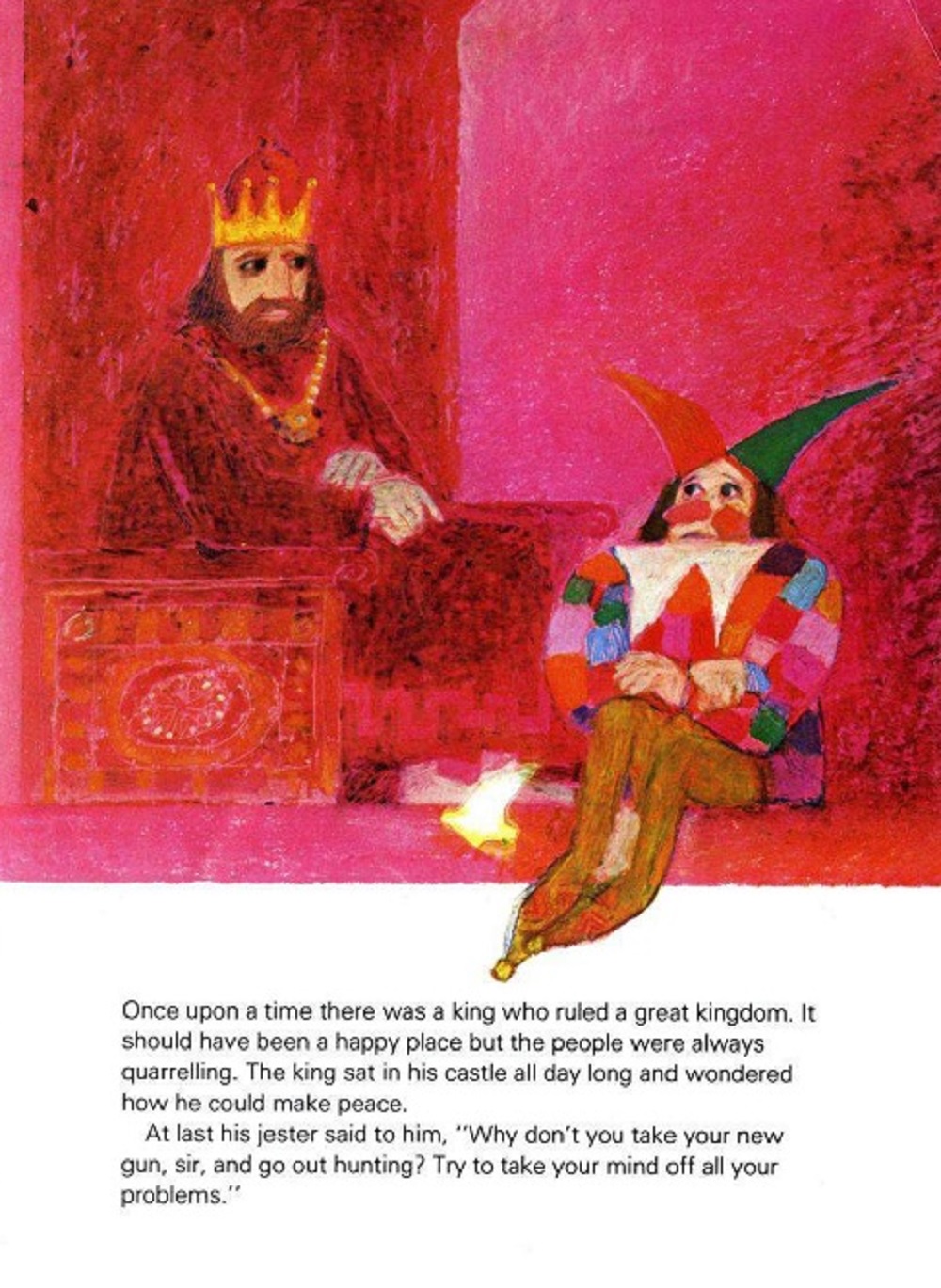
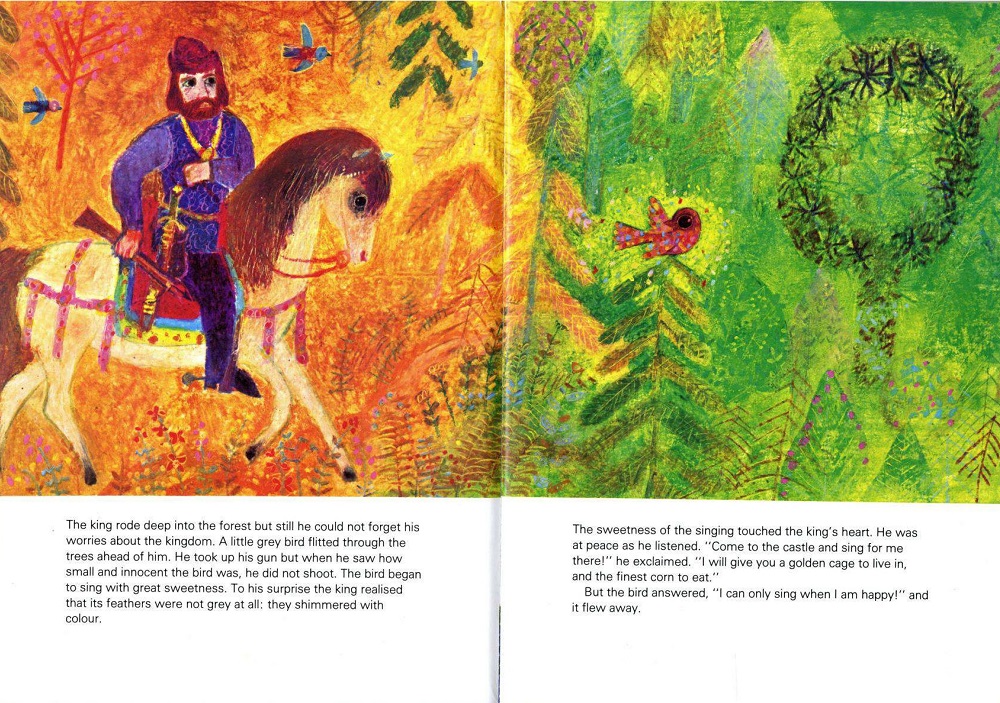
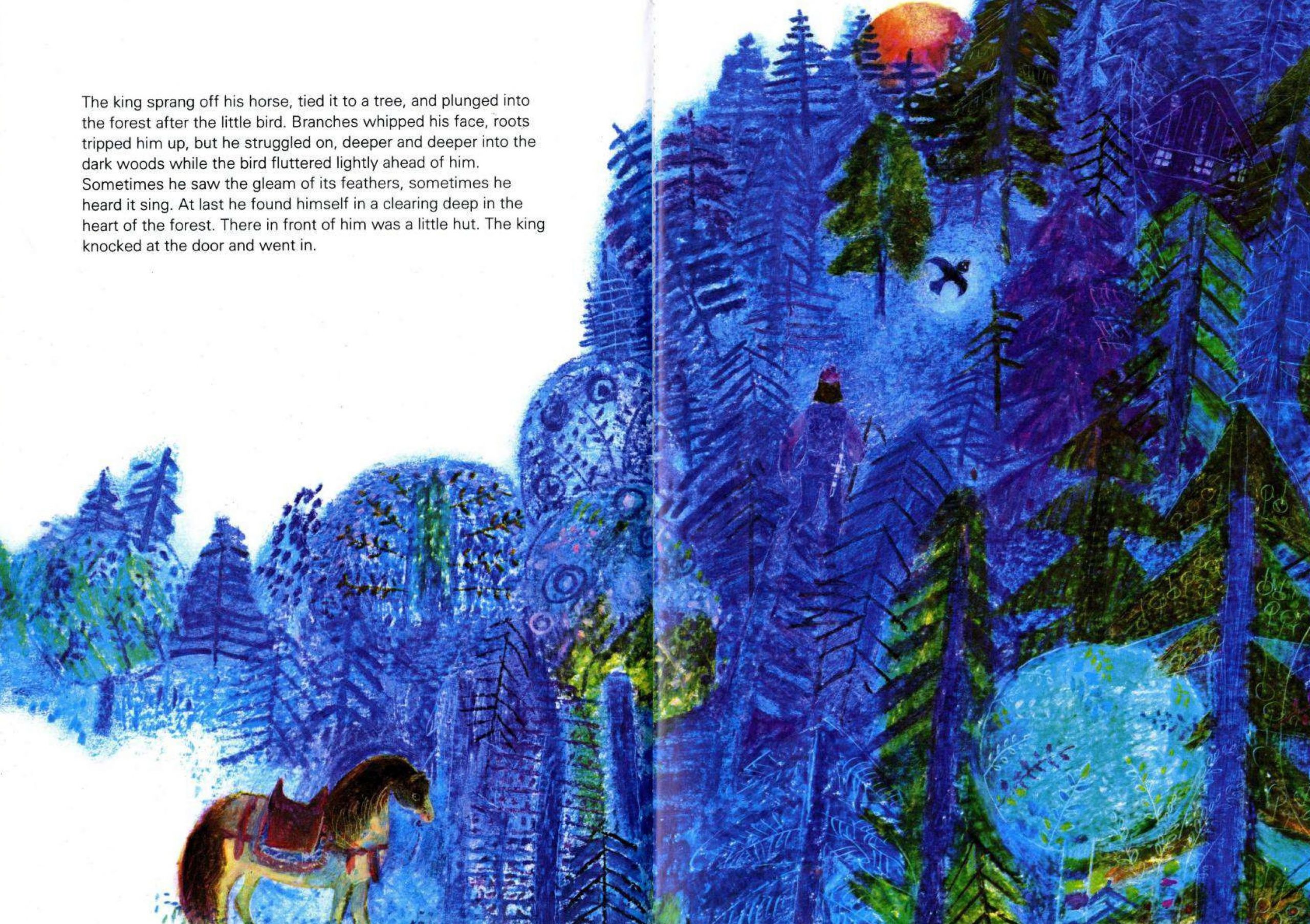
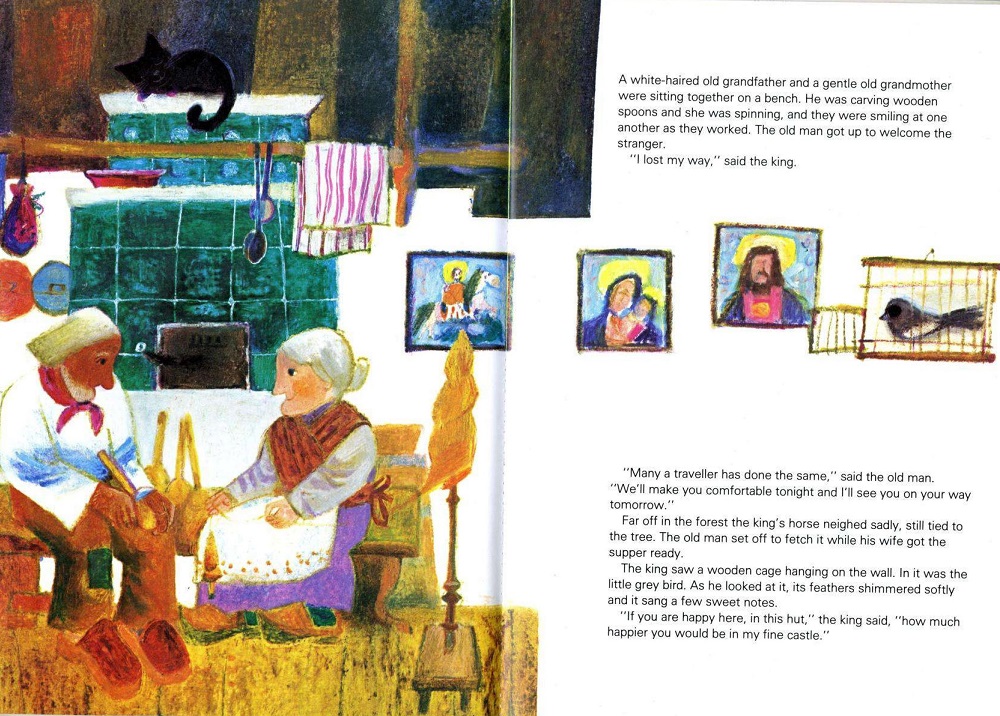
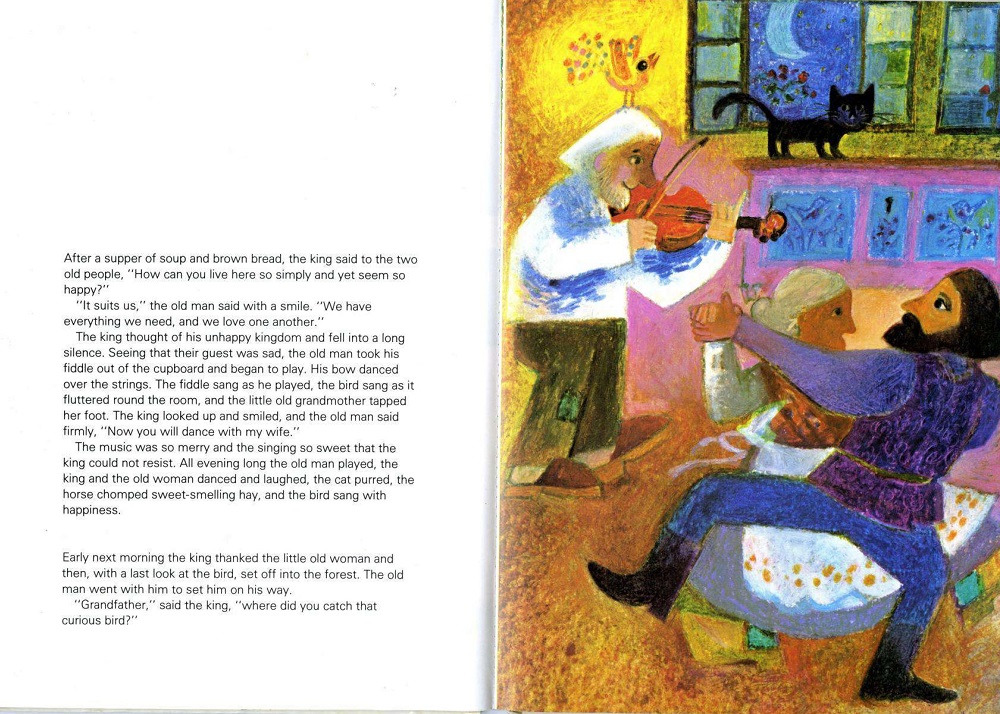
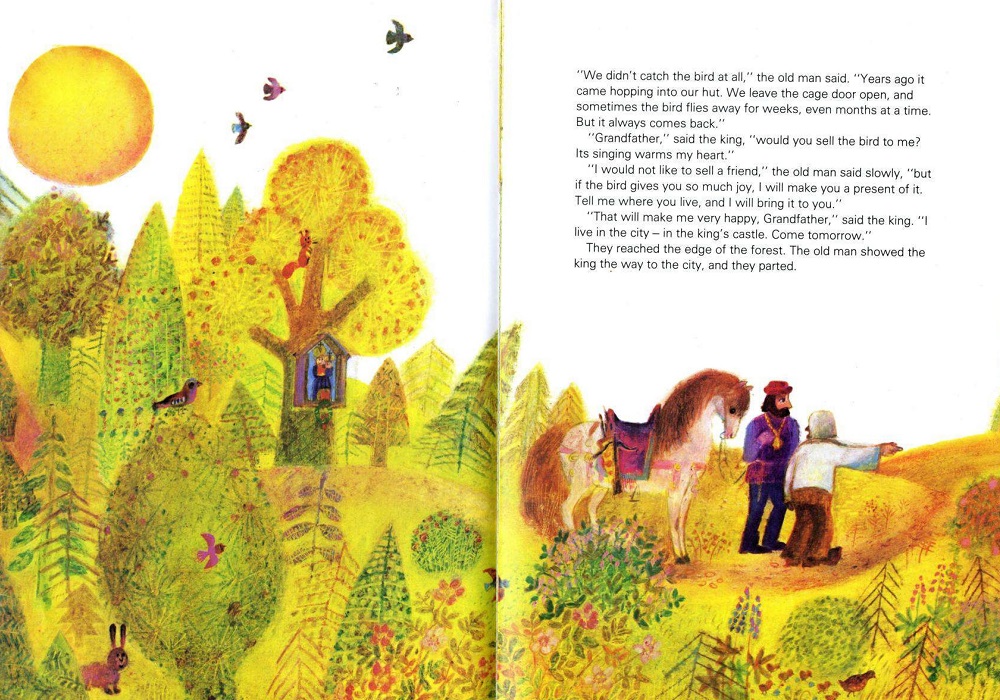
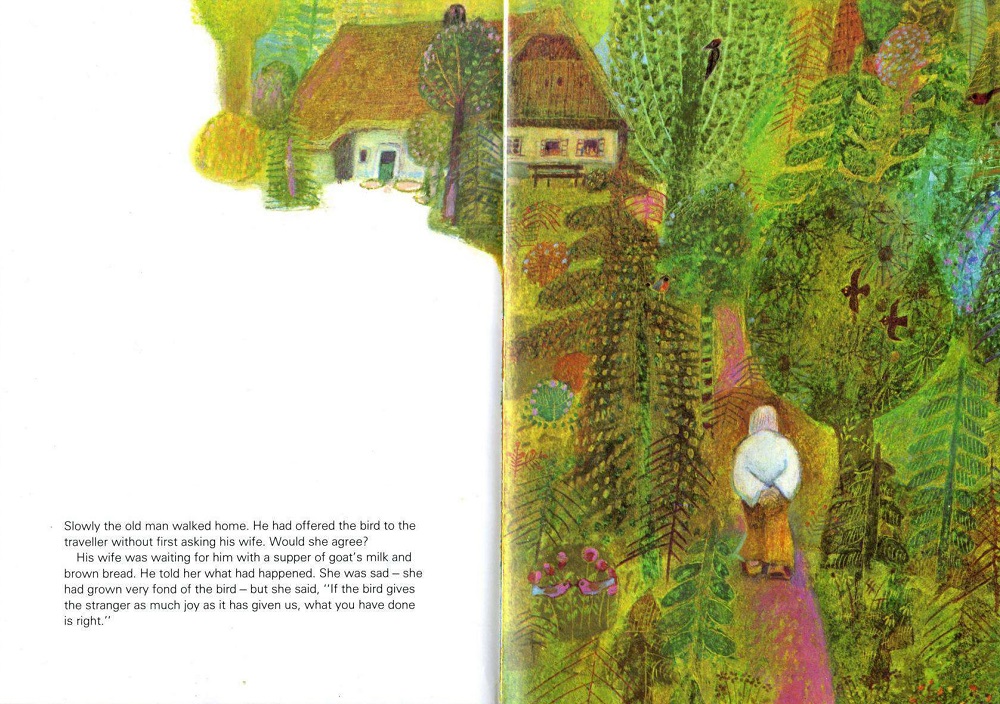
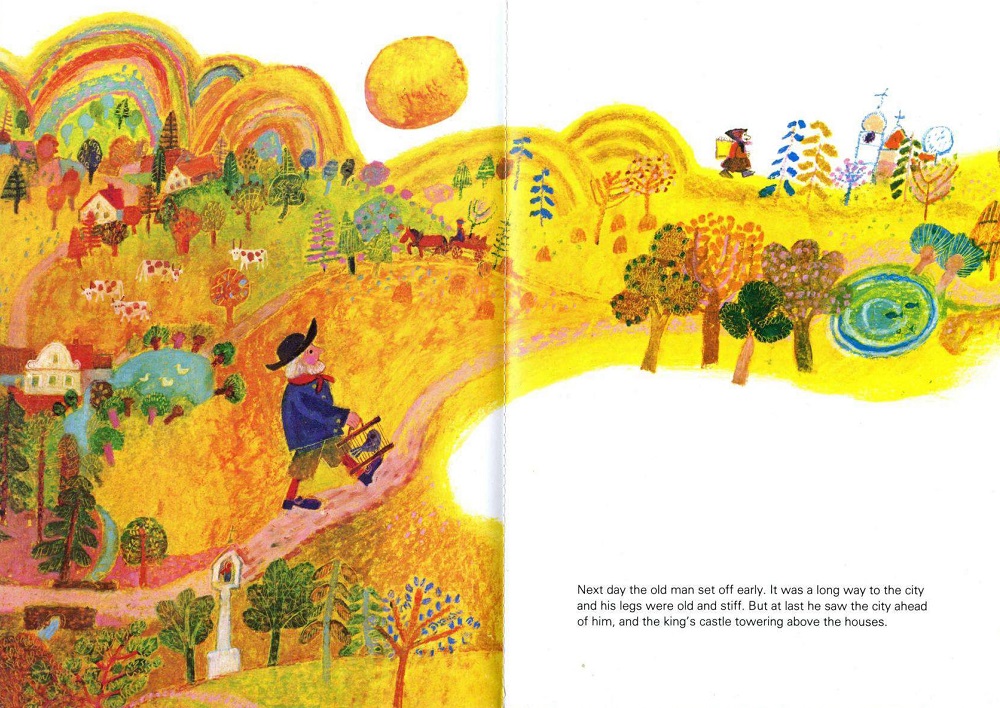
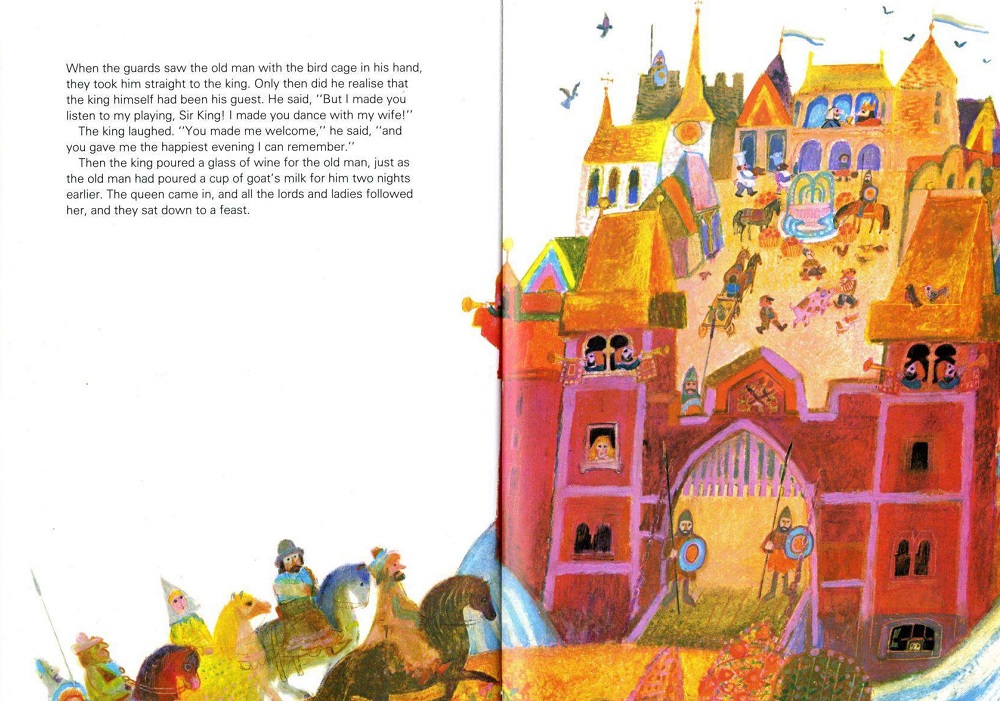
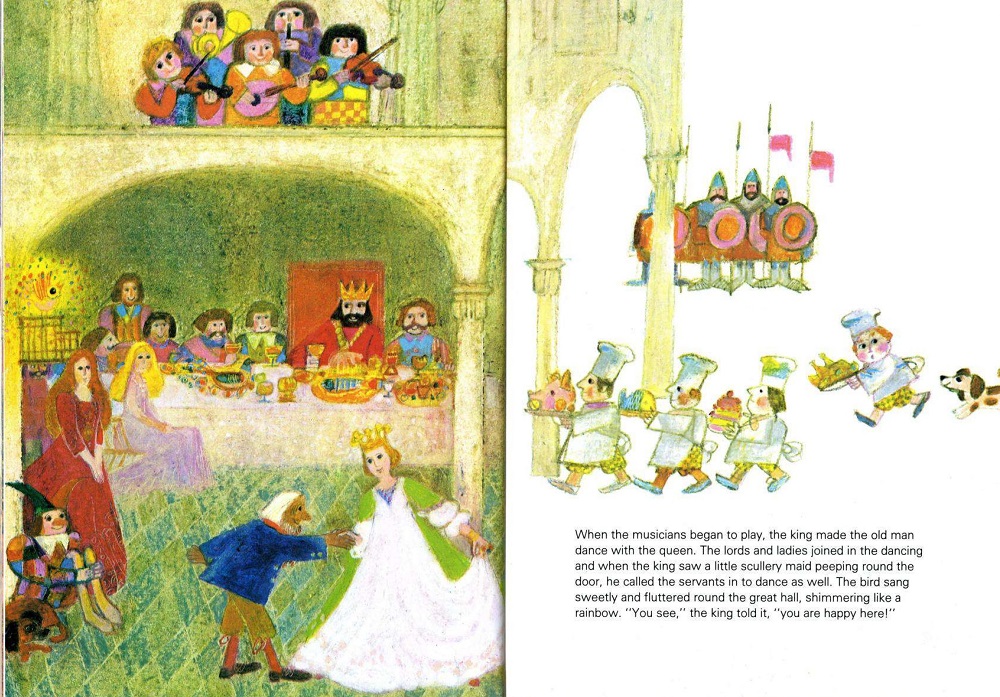
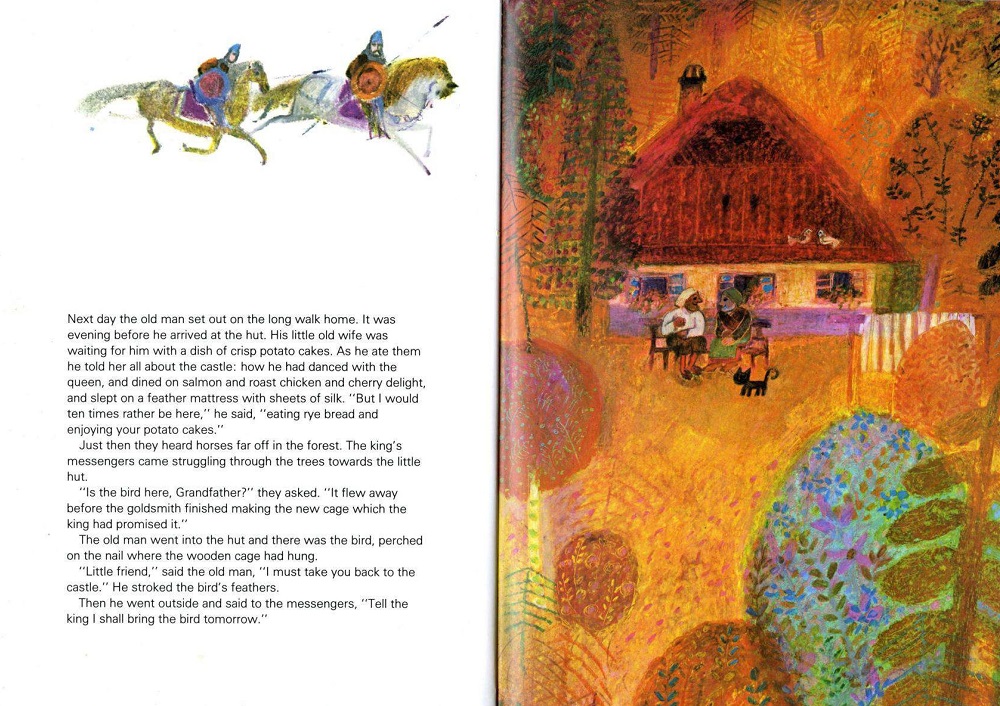
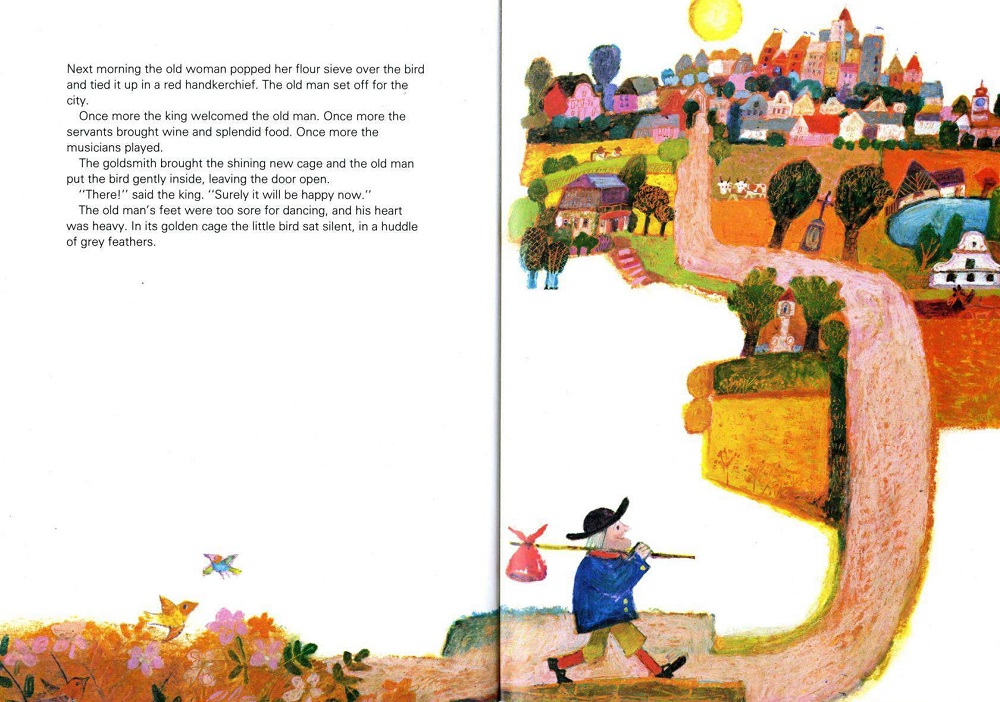
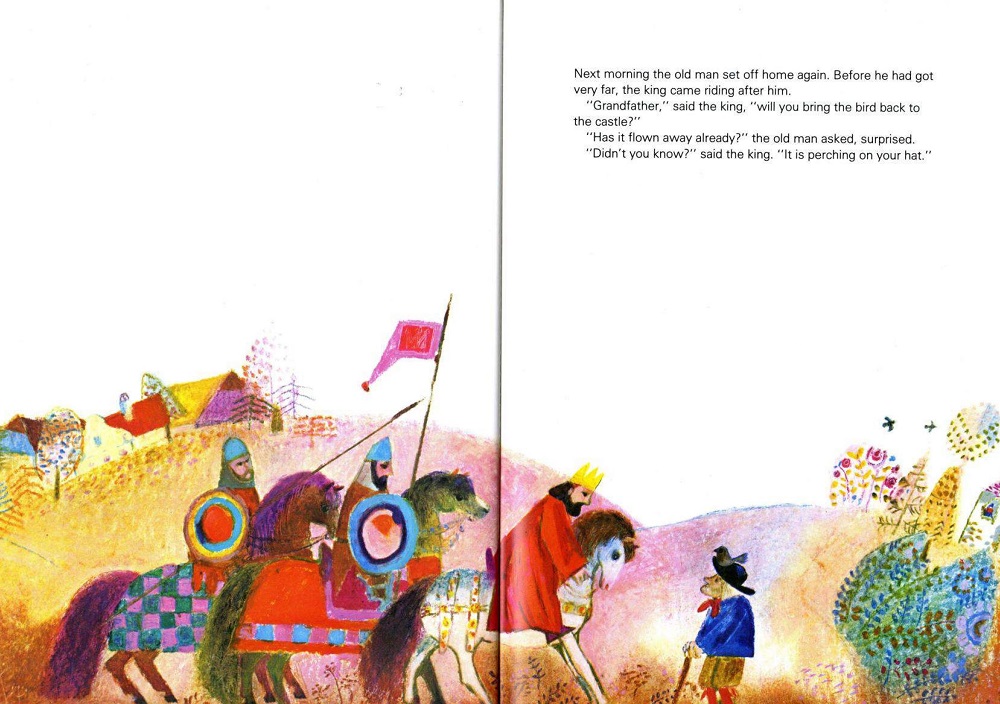
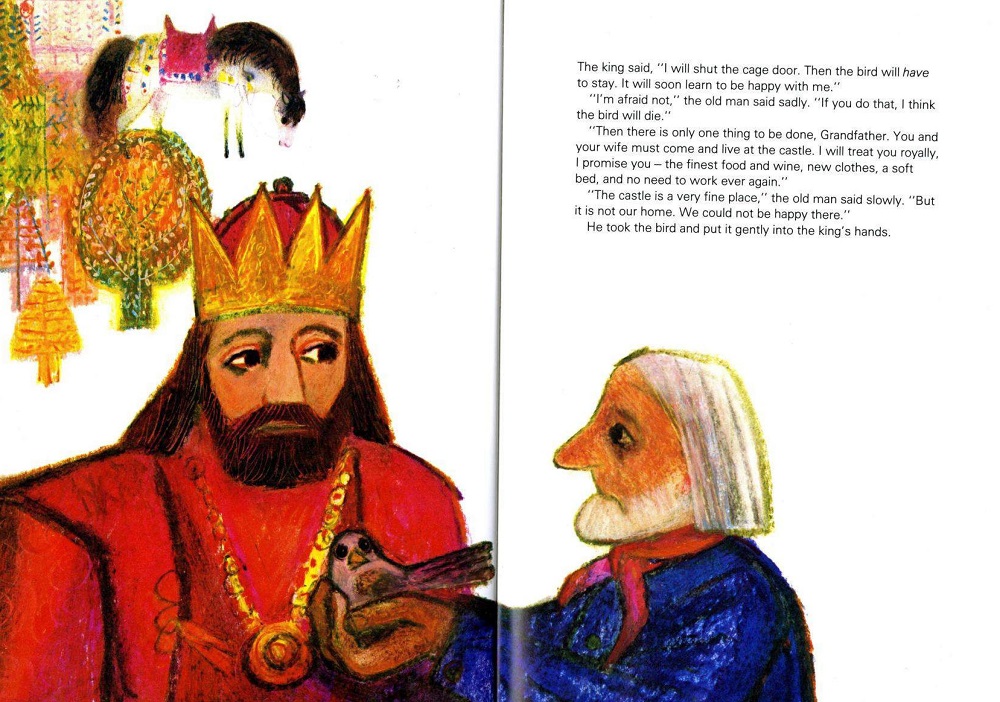
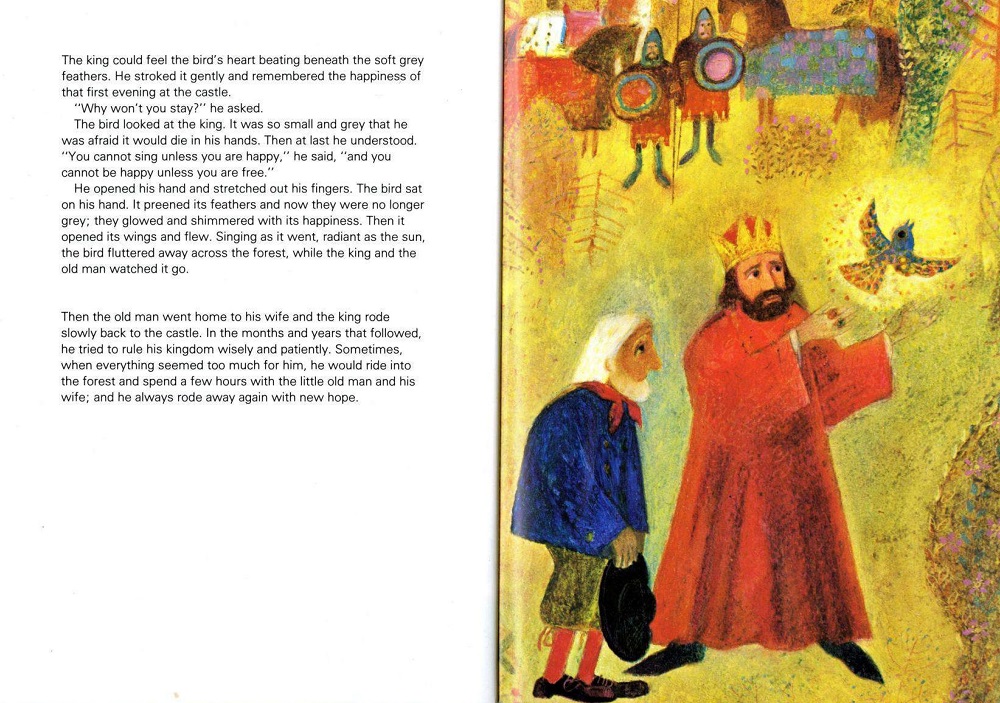
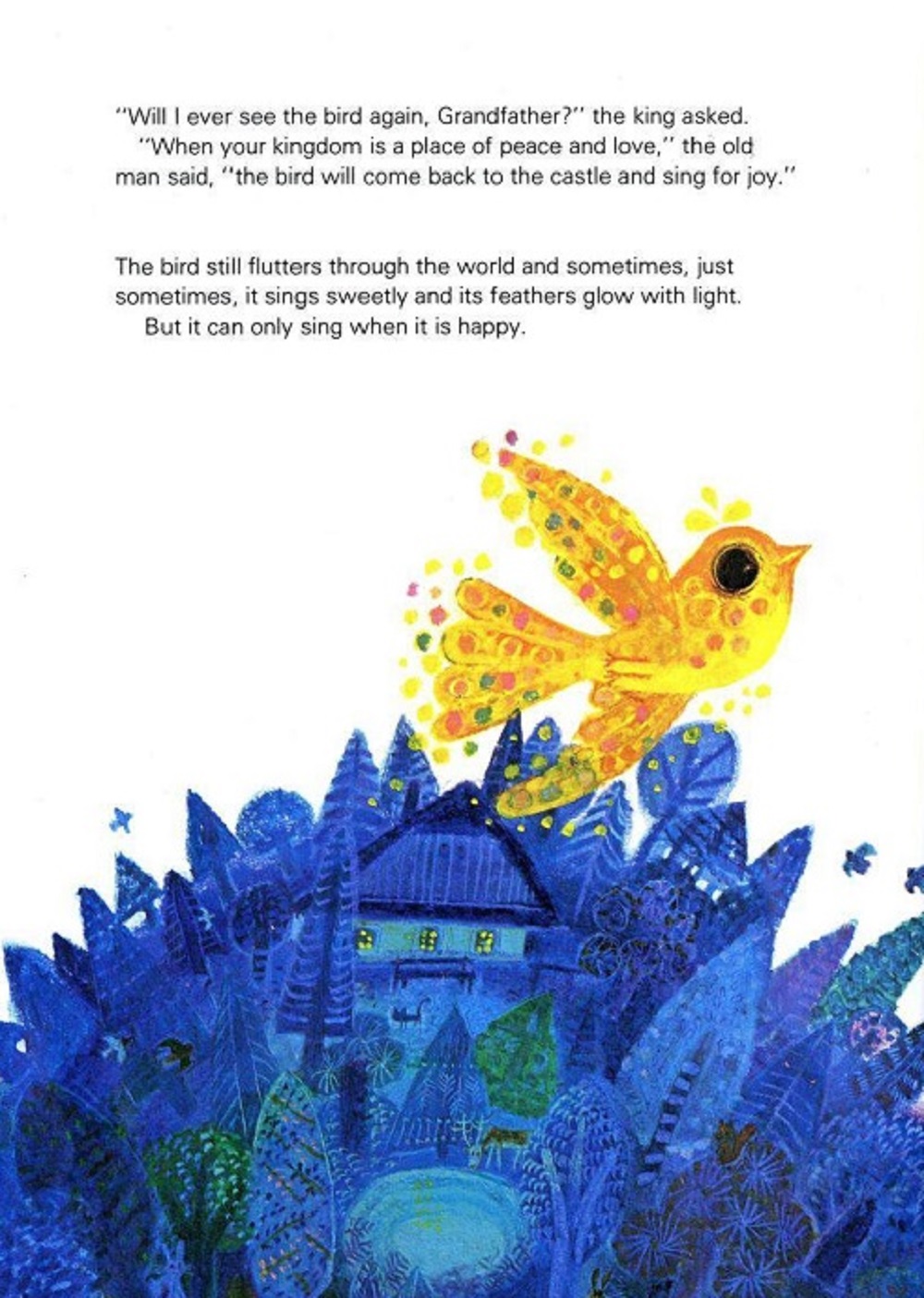
The little old wood-carver and his gentle old wife lived very simply in their shabby hut, deep in the forest, but they made the Kin welcome and gave him the happiest evening he could remember.
The old man played his fiddle, the old lady danced with their guest; and the little bird who had led the King to their home sang for happiness as it fluttered round the room.
“If you are happy here in this hut,” the King told the bird, “how much happier you would be in my fine castle.”
But the King was wrong.
This simple and charming story, based on an old folk-tale, tells how the King learned at last where and how true happiness might be found.
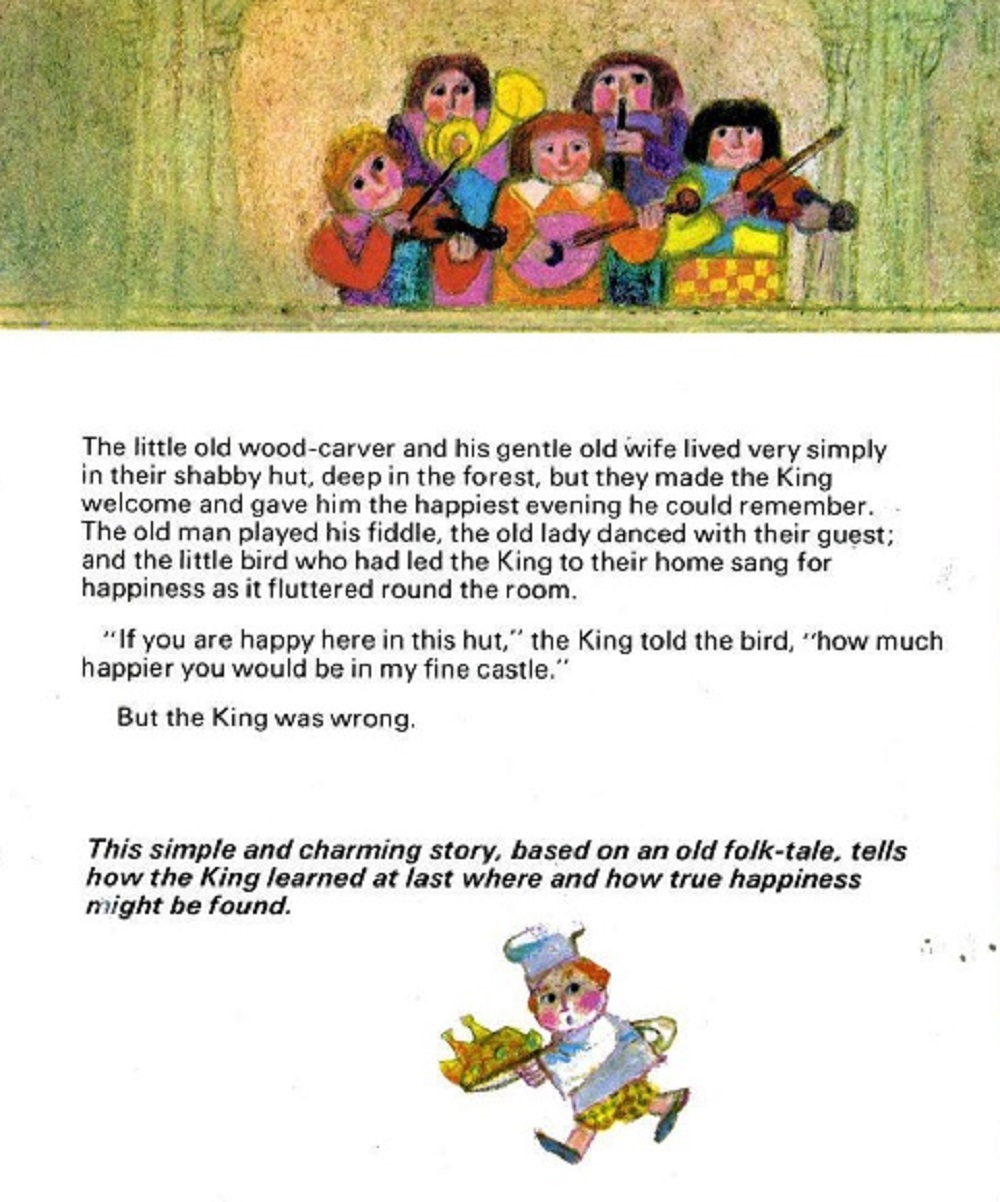
==============================
Once upon a time there was a king who ruled a great kingdom. It should have been a happy place but the people were always quarrelling. The king sat in his castle all day long and wondered how he could make peace.
At fast his jester said to him, ‘Why don’t you take your new gun, sir, and go out hunting? Try to take your mind off all your problems.”
The king rode deep into the forest but still he could not forget his worries about the kingdom, A little grey bird flitted through the trees ahead of him. He took up his gun but when he saw how small and innocent the bird was, he did not shoot. The bird began to sing with great sweetness. To his surprise the king realized that its feathers were not grey at all: they shimmered with color.
The sweetness of the singing touched the king’s heart. He was at peace as he listened. “Come to the castle and sing for me there!” he exclaimed. “I will give you a golden cage to live in, and the finest corn to eat.”
But the bird answered, “I can only sing when I am happy!” and it flew away.
A white-haired old grandfather and a gentle old grandmother were sitting together on a bench. He was carving wooden spoons and she was spinning, and they were smiling at one another as they worked. The old man got up to welcome the stranger, “I lost my way,” said the king.
“Many a traveler has done the same,” said the old man.
“We’ll make you comfortable tonight and I’ll see you on your way tomorrow.”
Far off in the forest the king’s horse neighed sadly, still tied to the tree. The old man set off to fetch it while his wife got the supper ready.
The king saw a wooden cage hanging on the wall. In it was the little grey bird. As he looked at it, its feathers shimmered softly and it sang a few sweet notes,
“If you are happy here, in this hut,” the king said, “how much happier you would be in my fine castle.”
After a supper of soup and brown bread, the king said to the two old people, “How can you live here so simply and yet seem so happy?”
“It suits us/’ the old man said with a smile, “We have everything we need, and we love one another,”
The king thought of his unhappy kingdom and fell into a long silence. Seeing that their guest was sad, the old man took his fiddle out of the cupboard and began to play. His bow danced over the strings. The fiddle sang as he played, the bird sang as it fluttered round the room, and the little old grandmother tapped her foot. The king looked up and smiled, and the old man said firmly, “Now you will dance with my wife.”
The music was so merry and the singing so sweet that the king could not resist. All evening long the old man played, the king and the old woman danced and laughed, the cat purred, the horse chomped sweet-smelling hay, and the bird sang with happiness.
Early next morning the king thanked the little old woman and then, with a last look at the bird, set off into the forest. The old man went with him to set him on his way,
“Grandfather,” said the king, “where did you catch that curious bird?”
“We didn’t catch the bird at all,” the old man said. “Years ago it came hopping into our hut. We leave the cage door open, and sometimes the bird flies away for weeks, even months at a time. But it always comes back.”
“Grandfather,” said the king, “would you sell the bird to me? Its singing warms my heart.”
“I would not like to sell a friend,” the old man said slowly, “but if the bird gives you so much joy, I will make you a present of it. Tell me where you live, and I will bring it to you.”
“That wife make me very happy, Grandfather;” said the king, “If live in the city – in the king’s castle. Come tomorrow.”
They reached the edge of the forest. The old man showed the king the way to the city, and they parted.
Slowly the old man walked home. He had offered the bird to the traveler without first asking his wife. Would she agree?
His wife was waiting for him with a supper of goat’s milk and brown bread. He told her what had happened. She was sad – she had grown very fond of the bird – but she said r “If the bird gives the stranger as much joy as it has given us r what you have done is right,”
Next day the old man set off early, it was a long way to the city and his legs were old and stiff. But at last he saw the city ahead of him, and the king’s castle towering above the houses.
When the guards saw the old man with the bird cage in his hand, they took him straight to the king. Only then did he realize that the king himself had been his guest. He said, “But I made you listen to my playing, Sir King! I made you dance with my wife!”
The king laughed, “You made me welcome,” he said, “and you gave me the happiest evening I can remember.”
Then the king poured a glass of wine for the old man, just as the old man had poured a cup of goat’s milk for him two nights earlier. The queen came in, and all the lords and ladies followed her, and they sat down to a feast.
When the musicians began to play, the king made the old man dance with the queen. The lords and ladies joined in the dancing and when the king saw a little scullery maid peeping round the door, he called the servants in to dance as well. The bird sang sweetly and fluttered round the great hall, shimmering like a rainbow. “You see,” the king told it, “you are happy here!”
Next day the old man set out on the long walk home. It was evening before he arrived at the hut. His little old wife was waiting for him with a dish of crisp potato cakes. As he ate them he told her all about the castle: how he had danced with the queen, and dined on salmon and roast chicken and cherry delight, and slept on a feather mattress with sheets of silk. “But 1 would ten times rather be here/’ he said, “eating rye bread and enjoying your potato cakes.”
Just then they heard horses far off In the forest. The king’s messengers came struggling through the trees towards the little hut, “Is the bird here, Grandfather?” they asked, “It flew away before the goldsmith finished making the new cage which the king had promised it.”
The old man went into the hut and there was the bird, perched on the nail where the wooden cage had hung.
“‘Little friend,” said the old man, “I must take you back to the castle.” He stroked the bird’s feathers.
Then he went outside and said to the messengers, “Tell the king I shall bring the bird tomorrow.”
Next morning the old woman popped her flour Steve over the bird and tied it up in a red handkerchief. The old man set off for the city.
Once more the king welcomed the old man. Once more the servants brought wine and splendid food. Once more the musicians played.
The goldsmith brought the shining new cage and the old man put the bird gently inside, leaving the door open.
“There!” said the king. “Surely it will be happy now.”
The old man’s feet were too sore for dancing, and his heart was heavy, in its golden cage the little bird sat silent, in a huddle of grey feathers.
Next morning the old man set off home again. Before he had got very far, the king came riding after him.
”Grandfather,” said the king, “will you bring the bird back to the castle?”
“Has it flown away already?” the old man asked, surprised.
“Didn’t you know?” said the king. “It is perching on your hat.”
The king said, “I will shut the cage door. Then the bird will have to stay. It will soon learn to be happy with me.”
“I’m afraid not,” the old man said sadly. “If you do that, I think the bird will die.”
“Then there is only one thing to be done, Grandfather. You and your wife must come and live at the castle. I will treat you royally, I promise you — the finest food and wine, new clothes, a soft bed, and no need to work ever again,”
“The castle is a very fine place,” the old man said slowly, it is not our home. We could not be happy there.”
He took the bird and put it gently into the king’s hands.
But, the king could feel the bird’s heart beating beneath the soft grey feathers. He stroked it gently and remembered the happiness of that first evening at the castle,
“Why won’t you stay?*’ he asked.
The bird looked at the king. It was so small and grey that he was afraid it would die in his hands. Then at last he understood, “You cannot sing unless you are happy/’ he said, “and you cannot be happy unless you are free.”
He opened his hand and stretched out his fingers. The bird sat on his hand. It preened its feathers and now they were no longer grey; they glowed and shimmered with its happiness. Then it opened its wings and flew. Singing as it went, radiant as the sun, the bird fluttered away across the forest, while the king and the old man watched it go.
Then the old man went home to his wife and the king rode slowly back to the castle. In the months and years that followed, he tried to rule his kingdom wisely and patiently. Sometimes, when everything seemed too much for him, he would ride into the forest and spend a few hours with the little old man and his wife; and he always rode away again with new hope.
‘”Will I ever see the bird again, Grandfather?”‘ the king asked.
“When your kingdom is a place of peace and love,” the old man said, “the bird will come back to the castle and sing for joy.”
The bird still flutters through the world and sometimes, just sometimes, it sings sweetly and its feathers glow with light. But it can only sing when it is happy.
Click here to download the .pdf version of the Czech Fairytale – The Bird of Happiness.
Thank you in advance for your support…
We know that you could spend hours, days, weeks and months finding some of this information yourselves – but at this website, we curate the best of what we find for you and place it easily and conveniently into one place. Please take a moment today to recognize our efforts and make a donation towards the operational costs of this site – your support keeps the site alive and keeps us searching for the best of our heritage to bring to you.
Remember, we rely solely on your donations to keep the project going.
We appreciate you more than you know!
If you have not already subscribed to get TresBohemes.com delivered to your inbox, please use the form below now so you never miss another post.





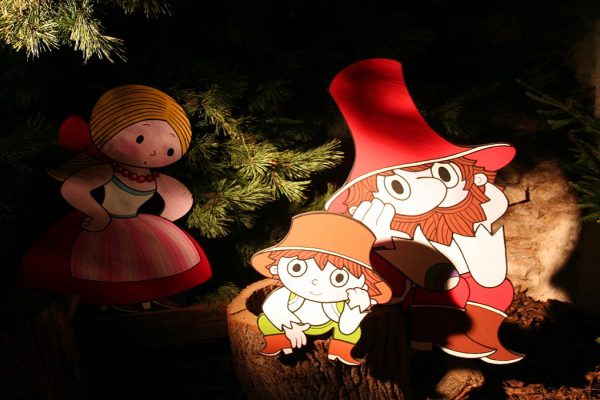
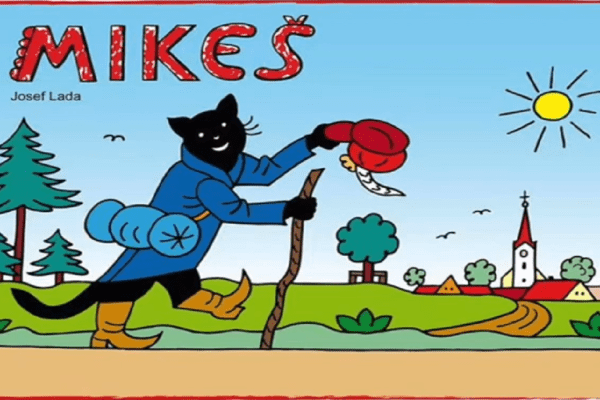















I remember listening to many fairytales as a child from my grandparents. The kids today who are not participating in this ages-old oral tradition are not only missing out on time with family members and the entertainment value of story, but on the way a human brain is wiring when listening to such stories. Perhaps that is the answer to why so many children today seem to behave in ways which could be described as soul-less, and why they lack empathy and compassion. There was a reason stories taught values and morals and without them we have the moral-less society we have today.
I am so happy having found this forum, it’s exactly everything my friends and I have been hoping for. The knowledge on this site is very appreciated and it entertains my family and friends a lot. I’ll visit often.